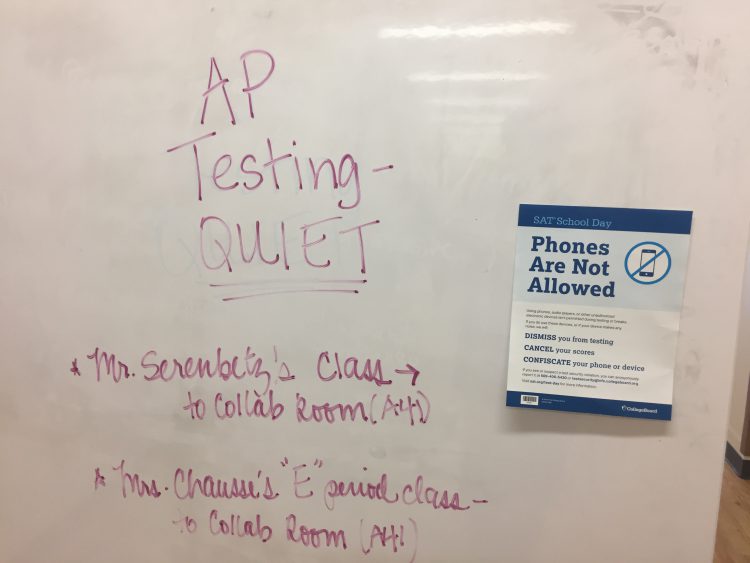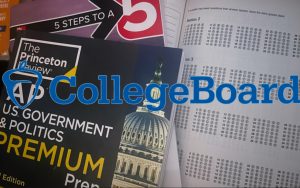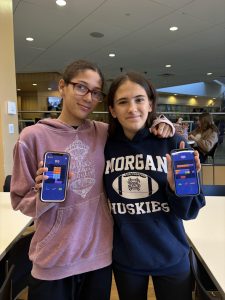AP Test Changes Covid19 Style
April 30, 2020
Written by Maggie Guba|
Photos by The Morgan PawPrint|
With all of the changes going on in the world today, AP tests are now being changed as well. CollegeBoard, the company which administers and monitors AP testing made the executive decision to employ new testing practices for this 2019-2020 school year.
The subject tests that students can take to potentially earn college credit are traditionally taken in school during the first weeks of May. In normal circumstances, students would sit for a three-hour test given by a certified proctor.
This year, instead of in-person tests, the AP tests will be online and done at home. They shortened 45 minute long tests consist of only Free Response Questions (FRQs) and will be open-note/open-book.
The exams will still be taking place from May 11 to May 22 with a makeup session from June 1 to June 5.
An updated list of dates and times for each test can be found here on CollegeBoard’s website.

Many students and teachers shared their perspectives on the changes that have been made.
World Language teacher Laura Luther explained, “The AP Spanish Language and Culture test will only be speaking this year. It will be two questions. (Usually it is almost a 4 hour test with multiple sections of reading, writing, listening and speaking) The College Board has made the decision. We will do our best to be ready. I have so much confidence in my students and I know that they will do their best. They are talented and hard-working!”
The new testing changes now allow teachers to receive students’ responses after they have completed the test which has never happened in previous years.
Social Studies teacher Christopher Zawadski said, “Unfortunately it is what it is. I’m glad the students still have an opportunity to earn AP credit. However, I am disappointed that the review for the exam will be at home instead of having valuable class time to review together. I will be interested to hear the student’s feedback after the exam is completed.”
Test changes for this year also decrease the material each test covers to be. CollegeBoard announced that all AP tests would only cover information learned from the beginning of the year to March.
Physics teacher Abigail Walston explained, “The AP Physics exam has been shortened to two free response questions. Honestly, I’m pretty excited about that. My students are strong in this area, and I’m optimistic this will help their scores. Three chapters have been removed, and while they’re chapters that I really enjoy and will miss teaching (sound and electricity) this is realistic in terms of the labs that can be done over the internet. My only real concern is that the students will be taking the exams at home, at a specific time, and I’m concerned about what will happen if they have random issues with WiFi or their Chromebooks. Otherwise, I’m very optimistic!”
Many students have mixed opinions on the changes that have been made to the tests.
Junior Emma Lindsay said, “I personally don’t like the test changes, but I understand why CollegeBoard came to this conclusion. The tests have to be administered in some way because refunds aren’t optional so I understand why they picked this as the simplest and most effective choice however I still am not happy. The time constraint is effective to prevent cheating, but it also adds an immense amount of pressure to students to think quickly and say everything they need to. Also for some classes like AP Gov and AP Physics, we have to study a year’s worth of material only to be given two random questions that we aren’t guaranteed to understand. I don’t feel like it’s representative of my knowledge or my abilities, but I would prefer FRQs to multiple-choice any day.”
Whether students and teachers like the new changes to the AP tests or not, they are happening.
Math teacher Ms. Jessica Lynch explained, “I think that CollegeBoard has been working really hard to give students an opportunity to still take the AP exams and potentially get college credit. Obviously, we are all under less than ideal conditions, but I am glad that students still have the opportunity to be rewarded for all their hard work this year. I think that it is very intimidating for students to go into a big exam that is only 2 questions, but I think that it is good that it is a shorter amount of time. I have found that with typical AP exams, it is hard for students to stay focused, especially on math, for 3 hours. I am hoping that by making the exam only 45 minutes, students will be more successful because they won’t be as mentally exhausted. As always, I think that the exam will be hard, but I am very hopeful that my students will do well!”
CollegeBoard is offering free online AP classes and review sessions for students.
This YouTube page provides all of the videos for the daily classes and review sessions offered.
In addition to what CollegeBoard has provided, there are also resources such as Khan Academy which provide practice to students in all different areas.
Social Studies teacher Mr. Jeffry Motter said, “The AP European History Exam has changed dramatically from a 3-hour and 15 minute exam to a 45-minute essay. Before the change, the test had four sections: fifty-five multiple-choice questions (55 minutes), three short-answer questions (40 minutes), one DBQ essay (60 minutes), and one “LEQ” or long essay (40 minutes). Now, all that remains is a 45-minute DBQ essay using five documents instead of the traditional seven. Fortunately, we have had ample time to review, both format expectations and content, with a variety of materials and resources. I am optimistic because, with a very similar routine and approach, last year’s group performed exceedingly well overall on the exam’s DBQ section.”
Changes to AP tests provide a new opportunity for success with the potential to earn college credit.







